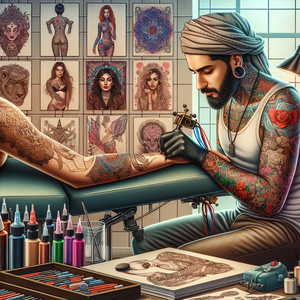
A Journey into Tattoo Artistry: Your Pathway to a Fulfilling Career
Starting a career as a tattoo artist is more than just a job; it's a thrilling adventure that marries artistry with entrepreneurship. Many aspiring tattooists wonder about the best steps to carve out a successful career in this vibrant field. This guide draws from the experiences of seasoned professionals and industry research to illuminate the key aspects of becoming a tattoo artist. From refining your artistic abilities and seeking apprenticeships to understanding the regulatory landscape, each step is crucial for your success. While some may favor formal education, the consensus is clear: cultivating a distinctive artistic style and a strong portfolio is paramount. The allure of freelance work and self-employment offers flexibility that appeals to many creatives. Ultimately, the journey to becoming a tattoo artist is filled with diverse opportunities that hinge on both artistic flair and business savvy.
Job Summaries:
Tattoo Artist:
- Tattoo artists create indelible designs on clients' skin with specialized tools and safe inks.
- Many tattoo artists work in established studios, but freelancing at conventions and private events is also common.
- Key duties include consulting clients to grasp their visions, crafting custom designs, maintaining a sterile workspace, and upholding high hygiene standards.
- A well-curated portfolio showcasing artistic prowess and tattoo techniques is essential.
- Most aspiring artists undergo apprenticeships with experienced mentors to gain practical insights.
- Annual earnings for tattoo artists can range from $30,000 to $100,000 depending on factors like location and experience.
- Keep an eye on job listings to launch your career.
Tattoo Apprentice:
- An apprenticeship is often the first step for those eager to learn the trade under the guidance of experienced tattoo artists.
- This role is foundational, focusing on observation, drawing practice, sterilization, and workstation preparation.
- A commitment to a rigorous training regimen—often spanning one to three years—is essential.
- To excel, aspiring apprentices should demonstrate a passion for art, a solid work ethic, and the ability to accept feedback.
- Many tattoo shops require a basic portfolio and some familiarity with tattoo art to secure an apprenticeship.
Tattoo Designer:
- Tattoo designers are the creative minds behind tattoo concepts tailored to clients' preferences.
- They may work independently or collaborate with tattoo artists to bring designs to life.
- Daily activities include sketching, client consultations, and design modifications.
- Strong artistic skills, creativity, and familiarity with graphic design software are crucial.
- A diverse portfolio showcasing your artistic style is vital for attracting potential clients.
- Freelance opportunities abound, with earnings fluctuating based on experience and project complexity.
Tattoo Shop Manager:
- Tattoo shop managers are the backbone of a studio, ensuring everything runs smoothly while prioritizing client satisfaction.
- Responsibilities encompass staff scheduling, customer service, inventory management, and compliance with health regulations.
- A background in business management or experience in the tattoo field can be beneficial.
- Strong leadership, communication, and organizational skills are essential for thriving in this role.
- Job openings for shop managers can often be found online, with salaries typically ranging from $40,000 to $70,000.
Mobile Tattoo Artist:
- Mobile tattoo artists bring services directly to clients, offering personalized and convenient experiences.
- This role requires exceptional time management and customer service abilities.
- In-depth knowledge of local health regulations is necessary.
- Ensuring that equipment is always ready and maintaining hygiene standards on-site is essential.
- Creativity and adaptability in various environments are important traits.
- Obtaining the necessary licenses and certifications is critical for success.
- Earnings vary widely based on skill and client base.
Tattoo Equipment Sales Representative:
- Tattoo equipment sales representatives bridge the gap between tattoo artists and the tools of their trade.
- They promote and sell tattoo supplies and equipment, requiring a solid understanding of tattoo tools, inks, and hygiene products.
- Daily tasks involve engaging with potential customers, product demonstrations, and attending trade shows.
- Excellent sales and communication skills, along with tattoo industry experience, are essential for success.
- Job openings in this area are available on various employment platforms, with salaries typically ranging from $35,000 to $60,000.
Tattoo Removal Technician:
- This specialized role involves using laser technology to remove unwanted tattoos.
- Tattoo removal technicians assess tattoos, explain the removal process, and skillfully operate laser equipment.
- A background in healthcare or aesthetics, along with training in laser technology, is often necessary.
- Strong customer service skills and attention to detail are crucial for client satisfaction.
- Training programs and job opportunities for removal technicians can often be found online, with potential earnings between $40,000 and $70,000.
Tattoo Aftercare Specialist:
- Aftercare specialists guide clients on how to care for their new tattoos, ensuring proper healing.
- Responsibilities include educating clients about aftercare best practices and recommending suitable products.
- A solid understanding of skincare and tattoo healing is critical.
- Strong communication and interpersonal skills are essential for building trust with clients.
- Opportunities for aftercare specialists can be explored through tattoo studios or health and beauty outlets.
- Salaries range from $30,000 to $50,000.
Tattoo Event Coordinator:
- Coordinating tattoo events, such as conventions and competitions, is the specialty of tattoo event coordinators.
- This role involves managing logistics, liaising with vendors and artists, and marketing events to attract attendees.
- Strong organizational and communication skills are key, along with experience in event planning.
- A passion for tattoo culture enhances the ability to succeed in this role.
- Positions in this area can be found on job boards, with earnings ranging from $35,000 to $60,000.
Tattoo Influencer:
- Tattoo influencers capitalize on their unique artistic styles and personal brands on social media to elevate tattoo culture.
- This role demands creativity, social media savviness, and consistent engagement with followers.
- Influencers share their tattoo work and collaborate with brands, often generating income through sponsorships and affiliate marketing.
- Building a substantial following is crucial for success.
- Aspiring influencers can explore strategies to grow their online presence and monetize their content.
The pursuit of becoming a tattoo artist or exploring related roles in the tattoo industry transcends mere artistic skill; it encompasses an understanding of the business landscape as well. By delving into various roles and their requisite skills, aspiring tattoo professionals can make educated decisions about their career trajectories. Whether your focus lies in artistry, management, design, or sales, the tattoo industry is brimming with opportunities for those willing to invest effort. Start by developing a portfolio, seeking apprenticeships, and building connections within the community to unlock the doors to a rewarding tattoo career. Begin your journey today by exploring current job openings and take that first step toward your dream in tattoo artistry!
Explore More Jobs

